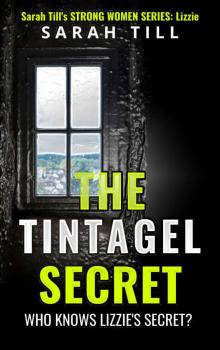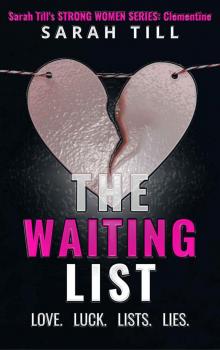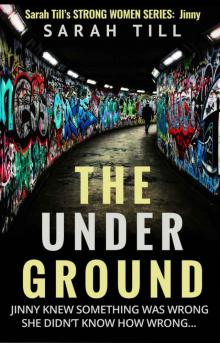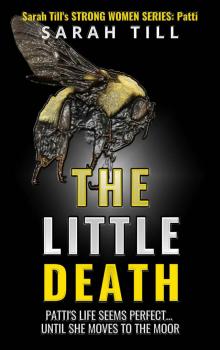- Home
- Sarah Till
The Under Ground (Strong Women Book 4)
The Under Ground (Strong Women Book 4) Read online
The Under Ground
Sarah Till's STRONG WOMEN Series, Volume 4
Sarah Till
Published by Novelesque, 2020.
This is a work of fiction. Similarities to real people, places, or events are entirely coincidental.
THE UNDER GROUND
First edition. June 30, 2020.
Copyright © 2020 Sarah Till.
ISBN: 978-0995485594
Written by Sarah Till.
Table of Contents
Title Page
Copyright Page
Dedication
Chapter One
Balance
Chapter Two
Providence
Chapter Three
Expectation
Chapter Four
Truth
Chapter Five
Tolerance
Chapter Six
Loneliness
Chapter Seven
Fear
Chapter Eight
Suzzy loves Robert 4 eva
Chapter Nine
Immaterial
Chapter Ten
Heaven
Chapter Eleven
Normality
Epilogue.
READ AN EXCLUSIVE CHAPTER SARAH TILL’S NOVEL THE WAITING LIST | Chapter One
Acknowledgements
Biography
Sarah Till Novels
For anyone who has known a man like Swiss Steve.
Chapter One
The day my mother was murdered, I realised that I was completely alone. The police knocked on my door at eight-thirty in the morning. I was just about to set off for work when I saw the two dark shadows through the heavily frosted glass of the vestibule door. My heart leapt before my hand went to the latch. I opened the door and the constables stood shoulder to shoulder.
“Mrs Munro?”
I nodded. It was almost as if there needed to be no words. The air was thick with intuition and I felt my pulse quicken.
“Yes.”
“Mrs Munro, it's about your mother. Can we come in?”
I turned and the constables followed me into the lounge.
“Where is she? Is she OK?”
When I managed to speak, the effort almost too much for my emotions. Of course, although I knew that something was wrong, I could never have predicted what they said next.
“I'm sorry, Mrs Munro. I'm afraid she passed away sometime between yesterday evening and six this morning.” My legs located the sofa and I sat. “The paperboy found her.”
“What happened to her?”
I admit now that I fully expected the policeman to say something compact like 'heart attack' or 'stroke'. Instead the two constables looked at each other.
“The coroner has been informed and your mother's body has been taken to the hospital. We would like you to come down to the station to help us to complete the picture.”
“What picture?”
Still unable to grasp the concept that my mother had died of unnatural causes, I sighed and took my coat from the back of the chair and got my bag. I walked silently with the policeman as they led me to the parked panda car. From the back of the small car I stared out of the window as they drove off.
My mother was dead and I felt alone. My emotions seemed as if detached and on their way ahead of us to my mother's home in the small village where she had lived. I suddenly began to resent her intrusion into my city life, the way I had seven years ago when I last saw her at my father's funeral. I had an important meeting today and she had once again caused a drama. My conscience got the better of me and I felt guilty for a few seconds, then my mind rallied and forged onwards to the funeral. Just a year ago I had received instruction through the post from her detailing exactly how she wanted her funeral to be arranged. She had thoughtfully included a receipt for the cremation service, the wake and even listed the clothes she would be dressed in. It had all been paid for and she made it clear in the impersonal instructions that no burden would be placed on me.
Except it was. How could she expect me not to feel something? How could your own mother order you not to love her anymore? It just wasn't a reasonable option. I could feel the burden getting heavier as we neared the police station. The two constables had remained silent during the short journey. The tension in the air suggested that there was more bad news to come. My mind caressed the notion that perhaps they were only qualified to give level one bad news, and I was being taken to someone who had level two or even three in harbingering. Eventually, we arrived and I was greeted by a balding, stout man.
“Mrs Munro?”
He held out his hand. I took it gently and then released it quickly as I sat.
“Jinny, please.”
“Ah, yes, Virginia. I see here that you were estranged from Sally Walton. Your mother.”
I leaned forward.
“Is this an interview, Mr...”
“I'm sorry, Mrs Munro, I assumed you had been briefed. Yes, we just wanted to ask you of your whereabouts yesterday and this morning. For our records, you understand? And of course we need to eliminate you from our inquiries.”
“Why? I thought my mother had died. hat inquiries? What's happened?”
The stout man looked at his colleague.
“I'm DI Payne and this in DC Harrison. I'm afraid that it appears that someone killed your mother. She was stabbed four times. The paperboy found her this morning. It would have been quick, Mrs Munro.”
I stared at the people in front of me, who clearly thought that I was going to speak. Words completely evaded me for a while. I finally summoned what I thought was an appropriate response.
“Can I see her?”
“Yes, we'll take you to the hospital. Someone will drive you. But first we need to know where you were from five p.m. yesterday until this morning.”
“I left work at five yesterday.”
“Work?” queried DI Payne. “Would that be for Pharmer and Jonston, Advertising and PR Consultants in SW3?”
“Yes. I work as a senior consultant there. I took the tube home, called at Smith’s in Victoria Station and then walked home. My partner, Ellis, was there. We had dinner, talked for a while, then we watched TV. Then we went to bed around eleven. He left just before your men turned up this morning.”
“Thanks. I'll get someone to drive you. We'll be in touch.”
I remained still for a moment.
“Is that it?” I asked abruptly. “Aren’t you going to ask me if she had any enemies, or if anyone hated her, or why she lived alone, or why I haven't seen her for seven years?”
Unexpected tears stung my eyes but would not fully emerge, leaving my sinuses to seriously overflow. DI Payne shuffled some paper and DC Harrison stared at me as if she was trying to read my mind or see inside my soul. DI Payne smiled slightly.
“No, no, no need to bother you with all that at the moment. John Baxter has filled us in. He told us that she had a foul temper and caused quite a lot of animosity in the village where she lived. And that she had practically cut herself off from her daughter and grandchildren. In actual fact, Mrs Munro, we need to find out who killed your mother. I personally don’t think you had anything to do with it, but we have to follow formalities. It may be that it was an attempted break in, or it may be someone she knew. Our forensic people are there now and we’ll know more when they are done.”
I paused for a moment and swallowed.
“Who the hell is John Baxter?”
This was the very first time I had heard this name, and this person seemed to know an awful lot about my family. DI Payne looked up from his shuffling.
“John Baxter? Surely you must know that your mother married
three years ago. John Baxter is your mother's husband. He lives at the deceased’s address. He was away on business last night but has been informed. He is at the hospital now. We interviewed him early this morning.”
My eyes widened.
“Married? Three years ago? And he’d been away conveniently when she was murdered?” Suddenly I felt defensive and uncharacteristically protective of my mother. “He would have a motive then? If they were married, wouldn’t he inherit all her money, and the farm?”
DS Payne glared at me.
“It appears, Mrs Munro, that Mr Baxter stood to inherit nothing. He is the executor of your mother’s estate and told us that you are the main beneficiary. So, your inheritance is safe.” He looked me in the eye and softened his tone. “It is my job, not yours to find the person who attacked your mother.”
I had heard enough. It had been four years since I last had a cigarette but now I needed nicotine. Or at least caffeine. I stood to leave and motioned towards the interview room door.
“I need to go home.”
“Don't you want to go to the hospital?”
DI Payne looked slightly irritated that I wasn’t following what was obviously a set pattern in a murder case by insisting on going to see a murder victim.
“No, no, I need to be alone. I'll go later.”
My mind continued the dialogue silently. It stated the patently obvious in its background ramblings, about there being no point going to the hospital as she was dead and you can't visit the dead. That she wouldn’t want me there anyway, even if she was dead. I left the room and stalked down the corridor and outside. I breathed the cold air and felt a familiar pressure in my chest. The leaning of some huge, invisible weight that had temporarily been raised but that was always held suspended above my body once again fell on me. In some ways I welcomed the pressure. It was like a dysfunctional relationship, inescapable because of its familiarity and the fear of the unknown other. I loved it and hated it at the same time. It was where I used to dwell, where I once fruitlessly sought authenticity. It was my family.
I never felt so alone as I did that day. My mother was dead, and it turned out she had remarried without telling me. I suddenly felt like the small child who had peeked through the banisters and had seen her mother drinking from a whisky bottle, then hitting out at her father. Like the teenager who’d witnessed her father's infidelity and was too afraid to tell her mother. Alone in a world where I was damned if I did and damned if I didn't. One that I had escaped seven years ago when my own life had suddenly soared through the glass ceiling that I had thought constrained it.
Of course, I wasn’t physically alone. I had Ellis and my daughter, Shiralee. My son, Jupiter. My fantastic job and work colleagues. My life was successful and I cherished every minute of my self-imposed routine. I dreaded a time when the old family drama would reappear to confuse me. In fact, I practically protected myself from it. These days, I liked to decide how alone I would be at any particular time.
I had admitted to myself a long time ago that I didn’t like my family. I didn’t like my mother. She was everything that represented the antithesis of myself. The slow drawl of gossip, the manipulation, the Machiavellian aims and the look of wide-eyed innocence when she was busted irritated me to the core. I avoided her like the plague. I had thought little more of my father, who was a near-alcoholic serial adulterer. I had loved my children dearly when they had been children, but, now they were grown into adults, they too irritated me. I had tried my best to feign loving affection and they had tried to fight the hormones and love me back. But in the end it all got too much for all of us and they had buggered off to university as soon as they could, never to return. Now Shiralee lived with her boyfriend around the corner but I rarely saw her. Jupiter, or Jupe as he now was known, continued to drop in unannounced and unwelcome to stare at me sullenly as he tapped Ellis up for money or a lift.
They hated me like I hated my parents. I had wondered if it was a strange genetic trait, where we all had a recessive gene that made it impossible to mask the negative feeling towards people who shared that same gene. I seemed to be in the centre of all the ill feeling and that in turn had made me physically ill. On a daily basis I balanced the amount of contact I had with these particular people who provoked these feelings within my karma and on most days I juggled perfectly. Today, I could feel the balls fall out of the air all around me and smash like rotten eggs at my feet, releasing the stench of responsibility into the air and inevitably into my lungs as I struggled to breathe.
I debated with myself whether I should go to the hospital and do my duty in front of the expectant eyes of those who ordained what we should do in these circumstances, or if I should simply go home and regroup. Either way, I would have to summon some kind of emotional showcase that, to my horror, was taking its time to emerge from the depths of my suppressed pain. If I went to the hospital, I would have to see my mother dead. I would have to meet her husband and pretend that there were no awkward circumstances and that we knew of each other, and be polite and obviously cry. If I went home, I would have to find a way to tell Shiralee and Jupiter that Granny was dead. I would have to tell their father, Swiss Steve, that Sally was dead, and endure any recriminations that every conversation with him implied.
The deciding factor was Ellis. I never, ever had to put on a show for him. I could go home and he would be there for me. He wouldn't hug me, because a hug would need reciprocation. He wouldn't even talk if I didn’t want to. He would just be there. I would know that he knew I was alone. I took my mobile phone from my bag and pressed Ellis on quick dial. After two rings, he answered.
“Hello?”
I paused.
“It's me. Mum's dead.”
“Oh shit. Shit.”
“Yes. She was murdered.”
“Shit. Are you OK?”
“I'm at the police station. I'm going to go home and get myself together.”
“I'll meet you there.”
“Bye.”
“Bye, Jinny. Don't drive. Get a cab.”
I knew he cared. He must care to put up with me. When we are alone we need no words. We just need each other, almost like we were meant to be together, but not in a romantic sort of way; more symbiotic. Ellis was my second chance at romantic love, my first having ended in total chaos and disaster.
I got a cab and went home. Opening my door and stepping into the house, I almost felt as if I had reversed the events of the morning and that their acknowledgement was optional. Ellis stood in the hallway looking slightly unsure. He stepped forward and looked to the left uncertainly.
“Hello Babe...”
Ellis always calls me Babe, even though I am forty-nine years old. I certainly don’t fit into the traditional ‘babe’ mould, that of slenderness and fair-haired prettiness. I’m curvy, brunette, middle-aged, but still retain a mysterious attractiveness that hints at a lot of energy and experience, at least in my mind. Ellis is forty-two and in the grip of his own particular mid-life crisis. I have never met a man like him before, uninterested in sport or other women but very interested in me as his partner. His main flaw being slight pessimism and I love him dearly. He stood in the hallway and held out his arms and I fell into them. We stood leaning on each other for a while and I felt the familiar feeling of belonging that seldom permeated my body seep silently in.
“What happened then?”
We released each other and walked through to the lounge.
“The police came, took me to the station, asked me where I was last night, then I left.”
“I meant what happened to Sally?”
Ellis had never met my mother. He was post-dad’s funeral, and I had resisted all his attempts to get to know my family. It was enough that he had to deal with Swiss Steve and my stroppy children. His own baggage, which he dutifully dragged behind him in the form of three sons and a deranged ex-wife, snapped at his heels often enough for me to keep them at a distance. The amalgamation of all these circumstances had ma
de him detached from any feeling for my family, almost as if they were strangers to him. We had agreed to let it just be us two living together in this huge house in the centre of London, shutting the door on the rest of the world. This had extended to unplugging the phone and deleting people from our social networking internet sites in order to retain our bubble of privacy.
“She was stabbed four times,” I heard my voice state matter-of-factly.
“Shit!” Ellis exclaimed.
“Yes. They have no idea who did it, could have been a break in or someone out to get her.” I sat down and rubbed my forehead. “Oh, and she got married three years ago. To someone called John Baxter.”
I could see Ellis’ lips struggle not to curl upwards in what we secretly called ILS. Inappropriate Laughter Syndrome. Ellis and I had counted this affliction amongst the things we shared in common when we first met. I possess an ability to laugh at completely the wrong moment and should I catch Ellis’ eye, he will erupt, too. Now, his body began to shake and his blonde hair stuck to the beads of sweat forming on his forehead from the effort not to giggle.
“Sorry,” he managed to giggle, “Only your mother could get married in secret and intentionally keep it from you. Didn’t Jupe go to see her just a couple of months ago? I wonder who she pretended this John Baxter was then?”
“Oh, yes, we’ll have to tell them. Jupe and Shiralee. We’ll have to tell them that Sally was murdered.”
“Oh, fucking hell!” Ellis exclaimed, clearly anticipating the scenario, an opportunity for two people who already incorporated the highest degree of drama into their everyday life to go completely RADA. He struck a pose and donned a pained expression. “I can see that this could be a perfect opportunity for them to try to extract some money from us.”
Even though his comment seemed overtly insensitive, I could not help but smile widely. Ellis and I certainly were on the same wavelength and we knew that we were targets for extortion as everyone thought we were extremely wealthy. The truth was that apart from the house, which I had inherited in unlikely circumstances from an ex-client and was crawling with clauses that meant we could not sell it, we had hardly any disposable income. Ellis worked as an artist and just about broke even. I worked as an advertising executive and my salary paid the huge household bills and our socializing expenses. Holidays were non-existent. Because we both dressed well, mainly from out-of-town charity shops and car boot sales and had a smart address, everyone thought that we were rich.

 The Tintagel Secret
The Tintagel Secret The Waiting List (Strong Women Book 5)
The Waiting List (Strong Women Book 5) The Under Ground (Strong Women Book 4)
The Under Ground (Strong Women Book 4) The Little Death
The Little Death